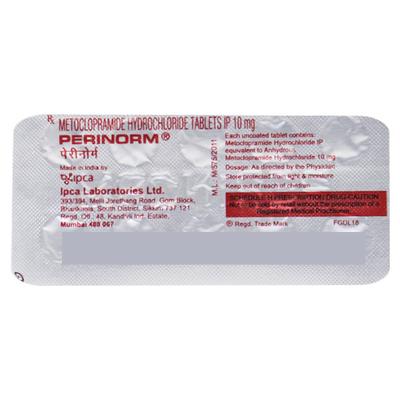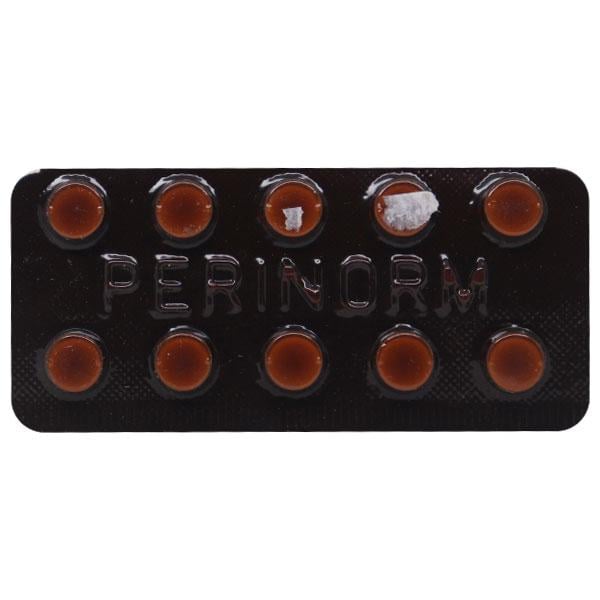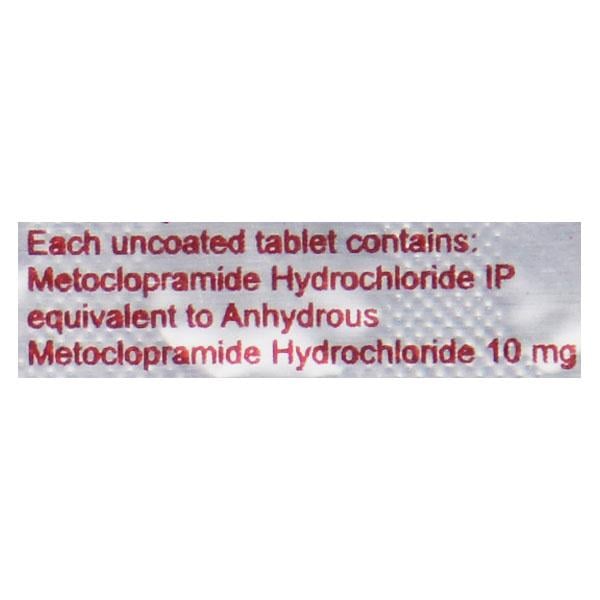

Netmeds First Membership
Quick Links
Introduction About PERINORM TABLET
PERINORM TABLET contains Metoclopramide which belongs to the group of medicines called Anti-emetics. It is used to manage nausea and vomiting which may occur after chemotherapy or radiotherapy. It can also be used to manage nausea and vomiting which occurs because of migraine. Migraine is a headache which causes severe throbbing pain or pulsing sensation particularly on one side of the head and it is characterized by symptoms such as nausea, vomiting and sensitivity to light.
Before taking PERINORM TABLET, inform your doctor if you are having liver, kidney or heart diseases, porphyria (rare blood disorder), brain problems or if you are taking any other medicines that may affect your heartbeat. Avoid consumption of alcohol while taking PERINORM TABLET as it may increase the risk of sedative effects.
Your doctor may perform blood tests during the management to monitor your blood pigment (haemoglobin) levels. Your doctor may immediately or permanently stop your management if there are any abnormalities in the levels of blood pigment.
PERINORM TABLET is not recommended for use in patients with epilepsy, parkinson’s disease, bleeding, obstruction or tear in the stomach or gut, tumour of adrenal gland and involuntary muscle spasms. PERINORM TABLET should be used with caution in pregnant women only if clearly advised by the doctor and it is not recommended for use in breastfeeding women as it may pass through the breast milk.
PERINORM TABLET is not recommended for use in children (below 1 year of age) and it should be used with caution in elderly patients. Consult your doctor before taking it. The most common side effects of taking PERINORM TABLET are drowsiness, restlessness, feeling weak uncontrollable body movements (such as muscle stiffness or rigidity) and diarrhoea. Consult your physician immediately if any of these side effects worsens.
Uses Of PERINORM TABLET
- Prevents nausea and vomiting due to chemotherapy or radiotherapy
- Manage nausea and vomiting (including migraine)
How PERINORM TABLET Works
PERINORM TABLET acts and supresses certain centres called dopamine (brain chemical) centres by decreasing the sensitivity of the nerves that transmit signals from gastrointestinal tract to the vomiting centres in the brain. It also relaxes the muscles of stomach and enhances the motility of gut and manages nausea and vomiting.
How to use PERINORM TABLET
Take PERINORM TABLET as advised by your physician. Swallow PERINORM TABLET with a glass of water. Do not crush or chew the medicine. Your doctor will determine the exact dose and duration for you depending upon your age, body weight and disease condition.
Side Effects Of PERINORM TABLET
Common
- drowsiness
- uncontrollable movements of body (such as shaking, tics, twisting movements or muscle stiffness or rigidity)
- rigidity and tremor (similar to Parkinson’s disease)
- restlessness
- diarrhoea
- feeling weak
Uncommon
- elevated levels of hormone called prolactin (which cause milk secretion in men and women who are not breastfeeding)
- irregular periods
- hallucinations
- decreased consciousness
- allergy
- visual problems such as involuntary deviation of eyeball
Rare
- confusion
- convulsions (fits) especially in patients with history of epilepsy (seizures)
Stop taking PERINORM TABLET and contact your doctor immediately if you experience any of the following side effects:
- uncontrollable movements of head and neck (occurs in children or young adults)
- signs of a brain disorder called neuroleptic malignant syndrome (such as high fever, high blood pressure, convulsions (fits) sweating and overproduction of saliva)
- signs of severe allergic reactions (such as itching, skin rashes, swelling of the face, lips and throat, breathing difficulties)
How To Manage Side Effects
Diarrhoea:
Drink lot of fluids, such as water or fruit juice to keep yourself hydrated. Avoid eating high-fat or spicy foods. Do not take any medicine on your own to manage diarrhea without consulting your doctor.
Feeling weak:
Drink plenty of fluid and eat balanced diet and frequent meals. Do regular minimal exercise (such as walking) and follow regular sleep schedule. Consult your doctor if the symptom does not improve.
Warning & Precautions
Pregnancy
PERINORM TABLET should be used with caution during pregnancy only if clearly advised by your doctor. Consult your doctor before taking it.
Breastfeeding
PERINORM TABLET is not recommended for use in breastfeeding women as it may pass through the breast milk and affect your baby. Consult your doctor before taking it.
Driving and Using Machines
Do not drive or operate any machines if you feel dizzy, drowsy or have uncontrollable twitching, jerking or writhing movements and unusual muscle tone leading to distortion of the body or your vision gets affected after taking PERINORM TABLET.
Alcohol
Avoid consumption of alcohol while taking PERINORM TABLET because it may increase the sedative effects.
Kidney
PERINORM TABLET should be taken with caution in patients with moderate or severe kidney disease. Consult your doctor before taking it.
Liver
PERINORM TABLET should be taken with caution in patients with severe liver problems. Consult your doctor before taking it.
Allergy
Do not take PERINORM TABLET if you are allergic to Metoclopramide.
Heart Disease
PERINORM TABLET should be taken with caution in patients having heart diseases such as abnormal heartbeats or any other heart problems. Consult your doctor before taking it.
Others
PERINORM TABLET is not recommended for use if you:
- have bleeding, obstruction or a tear in your stomach or gut
- have or may have a rare tumour of adrenal gland called pheochromocytoma
- had involuntary muscle spasms
- have epilepsy (seizures or fits)
- have brain disorder called parkinson’s disease
- had gastrointestinal surgery in the last 3 to 4 days
- had abnormal levels of blood pigments (methemoglobinemia or NADH cytochrome b5 deficiency)
Before taking PERINORM TABLET, inform your doctor if you:
- have problems with the salts in the blood such as potassium, sodium or magnesium
- have any brain problems
- have a history of immune problem called atopy (including asthma)
- have porphyria (rare inherited blood disorder)
Use in paediatrics:
PERINORM TABLET is not recommended for use in children (below 1 year of age) because of increased risk of uncontrollable movements. It should be used with caution in children and adolescents aged between (15-18 years of age). Consult your child’s doctor for advice.
Use in geriatrics:
PERINORM TABLET should be used with caution in elderly patients and your doctor may adjust the dose depending upon kidney or liver problems and overall health condition. Consult your doctor before taking it.
Interactions
A. Drug-Drug interactions:
Before taking PERINORM TABLET, inform your doctor if you are taking any of the following medicines:
- medicines used to manage a brain disorder called parkinson’s disease (Ex. levodopa, carbidopa)
- anticholinergics (medicines used to manage stomach cramps and spasms) Ex. dicyclomine, hyoscyamine
- morphine derivatives (medicine used to manage severe pain) Ex. oxycodone, oxymorphone
- sedative medicines (used to manage sleeping disorders, anxiety or panic attacks) Ex. diazepam, lorazepam
- medicines used to manage mental problems (Ex. quetiapine, risperidone)
- digoxin (used to manage heart failure)
- ciclosporin (used to manage immune problems)
- mivacurium and suxamethonium (medicines used to relax the muscles)
- atovaquone (used to manage pneumonia)
- fluoxetine and paroxetine (used to manage depression)
Overdosage:
If you or anyone else accidentally take too much of PERINORM TABLET, consult your doctor immediately or visit the nearby hospital. Symptoms of overdose are uncontrollable movements, feeling drowsy, impaired consciousness, confusion, hallucinations and heart problems.
Synopsis
| Drug | : | Metoclopramide |
| Pharmacological Category | : | Anti-emetics |
| Therapeutic Indication | : | Nausea and Vomiting |
| Dosage Forms | : | Tablet, Capsule, Syrup, Injection |
More Information
- Keep PERINORM TABLET out of reach of children
- Store PERINORM TABLET at room temperature
FAQs About PERINORM TABLET
What are the common side effects of [GBNKWYWORD]?
The most common side effects of taking PERINORM TABLET are drowsiness, uncontrollable movements of body (such as shaking, tics, twisting movements or muscle stiffness or rigidity), tremor and rigidity similar to parkinson’s disease, restlessness, diarrhoea and feeling weak. Consult your doctor immediately if you experience any of these side-effects.
Is PERINORM TABLET safe to use in children?
PERINORM TABLET is not recommended for use in children (below 1 year of age) because of the increased risk of uncontrollable movements. It should be used with caution in children and adolescents aged between (15 to 18 years of age). Consult your child’s doctor for advice before giving PERINORM TABLET to your child.
Can PERINORM TABLET be used in patients with kidney disease?
PERINORM TABLET should be used with caution in patients with moderate or severe kidney disease. Your doctor may adjust the dose depending upon kidney function. Consult your doctor before taking it.
Is PERINORM TABLET safe to use during pregnancy?
PERINORM TABLET should be used with caution during pregnancy only if clearly advised by your doctor. Consult your doctor before taking PERINORM TABLET if you are pregnant or planning to get pregnant.
Can I drive or operate machines after taking PERINORM TABLET?
Do not drive or operate any machines if you feel dizzy, drowsy or have uncontrollable twitching, jerking or writhing movements and unusual muscle tone leading to distortion of the body or your vision gets affected after taking PERINORM TABLET. Consult your doctor for advice before taking PERINORM TABLET.
References
1. KD Tripathi MD. Gastrointestinal Drugs. Essentials of Medical Pharmacology. Seventh Edition. May 2013.Page –664.
2. Sasank Isola, Azhar Hussain, Anterpreet Dua, Karampal Singh and Ninos Adams. Metoclopramide. NIH. National Library of Medicine, National center for biotechnology information. April 2022 [Accessed on 3rd August 2022] https://www.ncbi.nlm.nih.gov/books/NBK519517/
3. R J Gralla. NIH National Library of Medicine, National center for biotechnology information. Pubmed.gov. February 1983. [Accessed on 3rd August 2022] https://pubmed.ncbi.nlm.nih.gov/6682376/
4. Accord Healthcare Limited. Electronic Medicines Compendium (EMC). [Revised in October 2019] Accessed on 3rd August 2022] https://www.medicines.org.uk/emc/files/pil.5427.pdf
5. Accord. Electronic Medicines Compendium (EMC). [Revised in June 2020] [Accessed on 3rd August 2022] https://www.medicines.org.uk/emc/files/pil.5880.pd
6. Apotex Inc. Apo-Metoclop (Metoclopramide Hydrochloride 5 and 10 mg) [Revised in July 2014] [Accessed on 3rd August 2022] https://pdf.hres.ca/dpd_pm/00026164.PDF
Useful Diagnostic Tests
- Complete blood count










